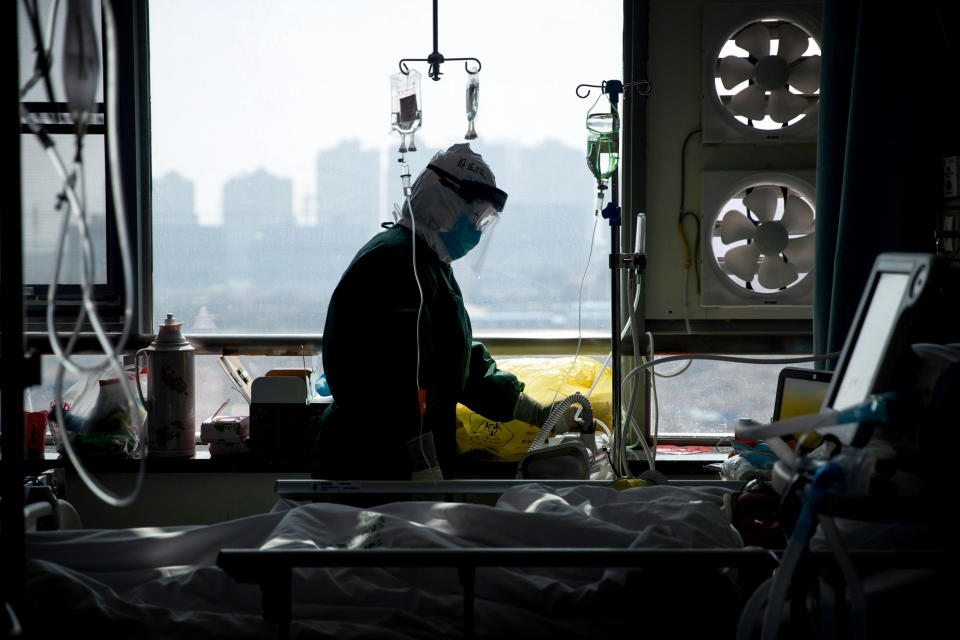'Not the time': Trump faces global criticism over move to end WHO funding
President Donald Trump's move to halt funding to the World Health Organization has been met with severe criticism at home and abroad, with the United Nations secretary-general saying "now is not the time" for such a drastic move while the coronavirus pandemic is gripping the globe.
Trump made the announcement Tuesday pending a review of the WHO's response to the initial coronavirus outbreak in China. He claims the agency has been too close to Beijing and covered up for its mistakes.
Congressional Democrats are disputing the president's authority to do this. Meanwhile Republican lawmakers are planning their own investigation, examining the early response by the WHO and the Chinese government.
"Now is a time for unity in the global battle to push the COVID-19 pandemic into reverse, not a time to cut the resources of the World Health Organization, which is spearheading and coordinating the global body's efforts," said U.N. Secretary-General António Guterres in a statement Tuesday.
China meanwhile expressed "deep concern" about Trump's announcement, its foreign ministry spokesman Zhao Lijian told a briefing.
"As the most authoritative and most professional organization, the World Health Organization has played an irreplaceable role in global public health crisis," the spokesman said. "The decision of the U.S. will undercut the ability of the WHO and damage the global cooperation of fighting the epidemic."
The European Union's foreign policy chief Josep Borrell tweeted similar misgivings.
Deeply regret US decision to suspend funding to @WHO. There is no reason justifying this move at a moment when their efforts are needed more than ever to help contain & mitigate the #coronavirus pandemic. Only by joining forces we can overcome this crisis that knows no borders.
— Josep Borrell Fontelles (@JosepBorrellF) April 15, 2020
Russian Deputy Foreign Minister Sergei Ryabkov slammed Trump’s move as "a very selfish approach." He told the TASS news agency, "We urge the United States to abandon further attacks on the WHO and pursue a responsible line."
And Moussa Faki Mahamat, the chairperson of the African Union Commission, called the decision "deeply regrettable."
It's not just governments and international organizations that have lined up to express dismay at Trump's move. Experts, entrepreneurs and others have also been quick to condemn the announcement.
Microsoft founder and philanthropist Bill Gates told his 50 million Twitter followers that halting the WHO's funding was "as dangerous as it sounds."
"Their work is slowing the spread of COVID-19 and if that work is stopped no other organization can replace them," Gates tweeted. "The world needs the WHO now more than ever."
Dr. Amesh Adalja, a senior scholar with John Hopkins University Center for Health Security, told Reuters, "The move sends the wrong message during the middle of a pandemic." While the WHO has made mistakes in the past, he added "It's not the middle of a pandemic that you do this type of thing."
And Richard Horton, editor-in-chief of the Lancet medical journal, described Trump's move as "a crime against humanity." He tweeted that "every scientist, every health worker, every citizen must resist and rebel against this appalling betrayal of global solidarity."
A slew of other world leaders and senior officials lined up to express their dismay over what they said was Trump's willingness to hamper the WHO just when the world needs it most.
The U.S. is the world's largest financial contributor to the organization, accounting for roughly 15 percent of its budget. Trump has said that amounts to some $500 million each year.
German Foreign Minister Heiko Maas said that ascribing blame "does not help" because "the virus knows no borders. We have to closely work together."
While New Zealand Prime Minister Jacinda Arden said that "at time like this when we need to be sharing information and we need to have advice we can rely on. The WHO has provided that."
Not everyone was quite so scathing. Australian Prime Minister Scott Morrison said he sympathized with some of Trump's criticisms of the WHO, but nevertheless said now was not the time "to throw the baby out with the bath water" and hobble the agency at a time of global crisis.

Trump has accused the WHO of "severely mismanaging and covering up" the coronavirus crisis, specifically the initial outbreak in Wuhan, China. He also claimed that the WHO "pushed China's misinformation about the virus ... and there was no need for travel bans."
He took particular issue with the agency's criticism of his order to temporarily deny entry to the U.S. by most foreign nationals who had recently been in China. The order was issued Jan. 31, when China was the center of the pandemic.
The president claimed that the WHO "pushed China's misinformation about the virus ... and there was no need for travel bans."
Download the NBC News app for full coverage and alerts about the coronavirus outbreak
The organization was informed of the first cases on Dec. 31. The next day the agency requested information from Chinese officials, and the Wuhan market where the outbreak is believed to have originated was closed for disinfection, according to a WHO report.
Then, on Jan. 30, the organization declared a global health emergency, as the number of cases hit 10,000.
Trump's move to halt funding for the agency that oversees international public health has raised questions about whether it could affect efforts by other countries to curtail coronavirus cases.
Dr. Patrice Harris, the president of the American Medical Association, excoriated the president in a statement Tuesday for making the move "during the worst public health crisis in a century."
"Cutting funding to the WHO — rather than focusing on solutions — is a dangerous move at a precarious moment for the world," Harris said. "The AMA is deeply concerned by this decision and its wide-ranging ramifications, and we strongly urge the President to reconsider."

